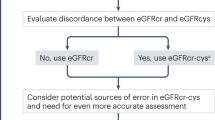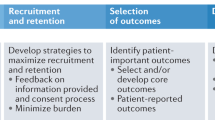Abstract
Access to essential medications is limited in many low-to-middle income countries (LMICs) and those that are available may be prohibitively expensive to the general population. Clinical trials have been suggested as an approach to improve drug access in LMICs but the number of trials conducted in these countries is small because of regulatory issues and a lack of infrastructure. In this article, Nature Reviews Nephrology asks three experts their opinions on how to improve drug access and increase the numbers of clinical trials conducted in LMICs.
This is a preview of subscription content, access via your institution
Access options
Subscribe to this journal
Receive 12 print issues and online access
$209.00 per year
only $17.42 per issue
Buy this article
- Purchase on SpringerLink
- Instant access to full article PDF
Prices may be subject to local taxes which are calculated during checkout

Similar content being viewed by others
References
Ayodele, O. E. & Alebiosu, C. O. Burden of chronic kidney disease: an international perspective. Adv. Chronic Kidney Dis. 17, 215–224 (2010).
World Trade Organization. Agreement on Trade-Related Aspects of Intellectual Property Rights. wto.org[online], (1994).
World Trade Organization. Declaration on the TRIPS Agreement and public health. wto.org[online], (2001).
Bird, R. C. Developing nations and the compulsory license: maximizing access to essential medicines while minimizing investment side effects. J. Law Med. Ethics. 37, 209–221 (2009).
Reichman, J. H. Comment: compulsory licensing of patented pharmaceutical inventions: evaluating the options. J. Law Med. Ethics. 37, 247–263 (2009).
Siva, N. Tackling the booming trade in counterfeit drugs. Lancet 376, 1725–1726 (2010).
New Partnership for Africa's Development. Historical context: origins and influences. NEPAD Transforming Africa[online], (2012).
Ba, D. Senegal president slams Nepad. IOL News[online], (2007).
Narsai, K., Williams, A. & Mantel-Teeuwisse, A. K. Impact of regulatory requirements on medicine registration in African countries—perceptions and experiences of pharmaceutical companies in South Africa. South. Med. Rev. 5, 31–37 (2012).
SADC Business Barriers: Case Study 04, access to medicines in Southern Africa. SAIIA[online], (2014).
Goldacre, B. Bad Pharma: How Drug Companies Mislead Doctors and Harm Patients. (Fourth Estate, 2012).
Orizio, G., Merla, A., Schulz, P. J. & Gelatti, U. Quality of online pharmacies and websites selling prescription drugs: a systematic review. J. Med. Internet Res. 13, e74 (2011).
Khan, T. Proposed law on medical devices 'could cost lives'. BD Live[online], (2014).
US National Library of Medicine. clinicaltrials.gov[online], (2014).
Jha, V. et al. Chronic kidney disease: global dimension and perspectives. Lancet 382, 260–272 (2013).
World Medical Association Declaration of Helsinki—Ethical Principles for Medical Research Involving Human Subjects. WMA [online], (2008).
World Medical Association Declaration of Helsinki—Ethical Principles for Medical Research Involving Human Subjects. Amended by the 64th WMA General Assembly, Fortaleza, Brazil, October 2013. WMA [online], (2013).
Venter, F. in South African Health Review 2012/13 Ch. 3. (eds Padarath, A. & English, R.) 37–47 (Health Systems Trust, 2013).
Ready, T. Pfizer in “unethical” trial suit. Nat. Med. 7, 1077 (2001).
Hyder, A. A. et al. Ethical review of health research: a perspective from developing country researchers. J. Med. Ethics 30, 68–72 (2004).
Roey, J. V. & Haxaire, M. The need to reform current registration processes to improve access to essential medicines in developing countries. Pharm. Med. 22, 207–213 (2008).
Harris, D. C. H., Dupuis, S., Couser, W. G. & Feehally, J. Training nephrologists from developing countries: does it have a positive impact? Kidney Int. Suppl. 2, 275–278 (2012).
Dixon, J. R. Jr. The International Conference on Harmonization Good Clinical Practice guideline. Qual. Assur. 6 65–74 (1998).
Ndomondo-Sigonda, M. & Ambali, A. The African medicines regulatory harmonization initiative: rationale and benefits. Clin. Pharmacol. Ther. 89, 176–178 (2011).
Cohen, E. R., O'Neill, J. M., Joffres, M., Upshur, R. E. & Mills, E. Reporting of informed consent, standard of care and post-trial obligations in global randomized intervention trials: a systematic survey of registered trials. Dev. World Bioeth. 9, 74–80 (2009).
Gabble, R. & Kohler, J. C. To patent or not to patent? The case of Novartis' cancer drug Glivec in India. Global. Health 10, 3 (2014).
Medicines and Related Substances Act 101 of 1965—Regulations and Notices—Government Notice R510. SAFLII[online], (2014).
Chatterjee, P. India tightens regulation of clinical trials to safeguard participants. BMJ 346, f1275 (2013).
Sackett, D. L. Six pairs of things to celebrate on International Clinical Trials Day. Trials 14, 128 (2013).
Rosenblatt, M. How academia and the pharmaceutical industry can work together. Ann. Am. Thorac. Soc. 10, 31–38 (2013).
African Medicines Regulatory Harmonization Programme. Update on the First Biennial Scientific Conference on Medicines Regulation in Africa “Building Partnerships for Sustainable Capacity Development in Medicines Regulation in Africa”, 2–3 December 2013, Johannesburg, South Africa. amrh.org[online], (2013).
NEPAD establishes centres of excellence to help strengthen regulatory capacity development. PharmaAfrica[online], (2014).
Acknowledgements
F.V.'s work is supported by The U.S. President's Emergency Plan for AIDS Relief.
Author information
Authors and Affiliations
Corresponding authors
Ethics declarations
Competing interests
I.G.O. has received travel grants from Roche and Adcock-Ingram. C.R.S. is the Medical Advisor of Fresenius Medical Care, South Africa. He has received honoraria and travel grants from Roche, Amgen, Sanofi and Abbott. F.V. has received speaking fees from Abbot, Gilead, Johnson & Johnson, Merck, Aspen and Adcock Ingram, and is on advisory boards for Mylan and Johnson & Johnson.
PowerPoint slides
Rights and permissions
About this article
Cite this article
Okpechi, I., Swanepoel, C. & Venter, F. Access to medications and conducting clinical trials in LMICs. Nat Rev Nephrol 11, 189–194 (2015). https://doi.org/10.1038/nrneph.2015.6
Published:
Issue Date:
DOI: https://doi.org/10.1038/nrneph.2015.6
This article is cited by
-
The Myeloproliferative Neoplasm Landscape: A Patient’s Eye View
Advances in Therapy (2020)
-
Human dignity as a basis for providing post-trial access to healthcare for research participants: a South African perspective
Medicine, Health Care and Philosophy (2018)
-
Nephrology research—the past, present and future
Nature Reviews Nephrology (2015)



